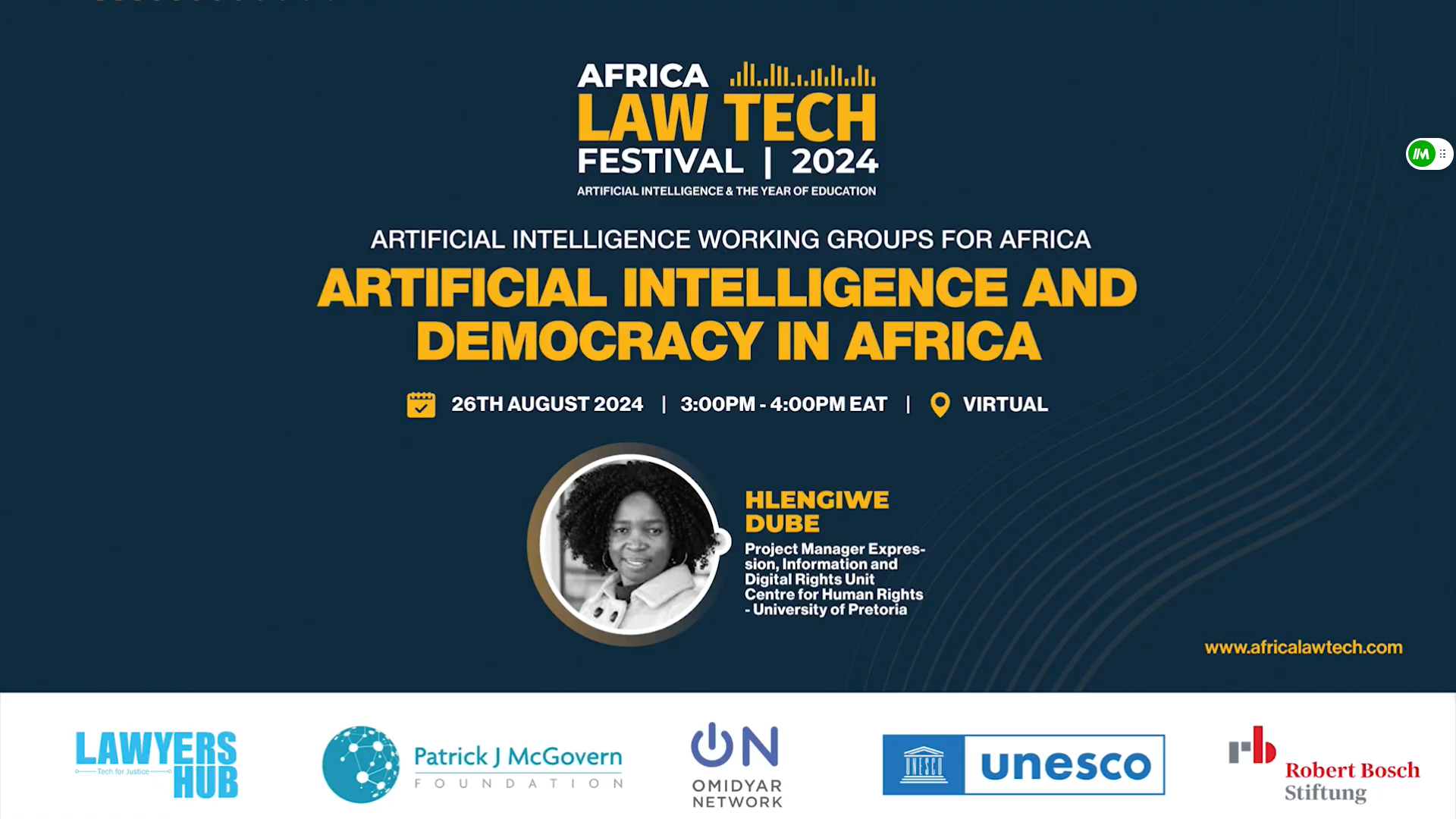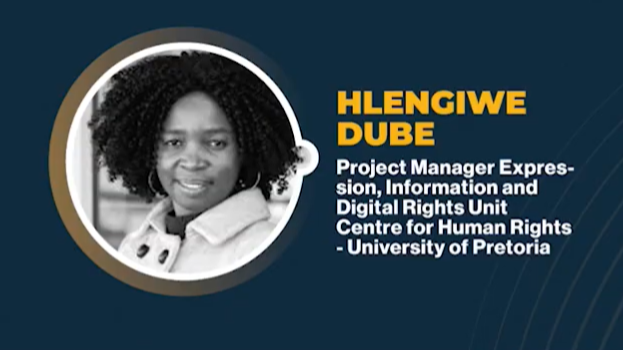
The session was attended by over 1,550 delegates from 50 countries participating in the Africa Law Tech Festival 2024. The speaker was Hlengiwe Dube, the Expression, Information, and Digital Rights Project Manager at the Centre for Human Rights, University of Pretoria. She focuses on issues related to freedom of expression, access to information, and the intersection of technology and human rights across the African continent.
Watch the Full Session HERE
Over the past few years, technology has profoundly impacted elections worldwide. In the past decade, technological advancements in democratic processes, such as biometric technology and e-voting, have played a significant role in elections. In Africa, the continent has experienced democratic changes since the colonial period, with a gradual transition towards democratic governance. This shift has been marked by the adoption of multiparty systems, such as in Kenya in 1992, the peaceful transfer of power, and the expansion of political freedoms. Many African countries have developed or amended their constitutions to allow regular elections, enabling citizens to choose their representatives through democratic processes and incorporating technological advancements into civil processes. The rise of vibrant civil societies, independent media, and active citizen engagement has further promoted democracy.
However, recent advancements in artificial intelligence, particularly generative AI, could have an unprecedented impact on the electoral process. These innovations offer opportunities to improve electoral efficiency and voter engagement but also raise concerns about potential misuse. Against this backdrop, the Lawyers Hub organized a session at the Africa Law Tech Festival 2024 on "The Role of AI in Preventing and Monitoring Human Rights Abuses During Electoral Processes in Africa." This article outlines the key discussions from the session and provides recommendations to guide the future adoption and use of AI technologies in African elections and democratic processes.
Session Overview




According to UNESCO’s Guide for Electoral Practitioners, AI can improve the efficiency and accuracy of elections by engaging voters through personalized communication tailored to individual preferences and behaviors. For instance, AI-powered chatbots can provide real-time information about polling locations, candidate platforms, and voting procedures, making the electoral process more accessible and transparent.
AI also enhances data management by ensuring accurate collection, storage, and analysis of extensive electoral data. This enables election officials to make swift decisions and effectively identify trends. Automated systems can manage large datasets with speed and precision, significantly reducing human errors. This leads to more reliable and timely results, thereby reinforcing public trust in the electoral process.
In terms of security, AI strengthens electoral integrity by fortifying cybersecurity measures against threats. It can detect anomalies and fraudulent activities, ensuring the resilience of electoral infrastructure. Daniel Innerarity, in “Artificial Intelligence and Democracy,” highlights that AI can also facilitate voter engagement through chatbots and social media discussion forums. By gathering valuable insights from user comments, AI enables real-time data analysis, allowing campaign strategists to adjust their approaches based on public opinion.
AI has the potential to enhance democratic processes and human rights by promoting transparency and accountability. For instance, platforms like "Ushahidi" in Kenya and "Afriwitness" in South Africa utilize AI to monitor elections and document human rights abuses, contributing to greater oversight and responsiveness in governance. Platforms like "Zindi" in Zimbabwe leverage AI to strengthen governance by enabling governments to analyze data for better policy formulation. Lastly, Rwanda is exploring AI-powered chatbots to improve access to government services, showcasing the technology’s potential to bridge gaps between citizens and state institutions.
While the role of AI in African elections is still evolving, a small fraction of African electoral commissions are advanced in AI uptake. A recent Yiaga Africa survey of electoral commissions in 22 African countries reveals that AI is being deployed for voter register management, automated chatbots for voter engagement, voter authentication, and cyber threat detection in South Africa, Eswatini, Madagascar, and Nigeria, respectively. AI is addressing the challenge of human interference and inefficiency in elections by facilitating oversight and accelerating decision-making. Advanced analytics and machine learning models detect anomalies and inaccuracies in election data to avert manipulation.
There is no doubt that the use of AI will in one way or another improve the transparency, accountability and effectiveness of electronic processes in Africa and the world at large. But there are challenges to its adoption, implementation and use by various actors in the chain of elections from the voters, electronic commissions and the politicians at large. These challenges are discussed below.
Challenges of Accessibility and the Digital Divide
While AI offers numerous benefits, the speaker also acknowledged the challenge of accessibility, particularly for marginalized communities. One of the significant challenges with advancements and use of any technology in the African continent is the Digital divide challenge. Only 36% of Africa's population had broadband Internet access in 2022. Access is a key challenge for the continent. These technologies need to not only be accessible to the privileged but are also extended to underserved communities.


Other challenges
The deployment of AI in Africa’s electoral systems faces several significant challenges, which hinder its widespread adoption and effective use. Financial constraints are one of the challenges. Many African nations struggle with limited resources, making it difficult to invest in the expensive infrastructure, technology, and expertise required for advanced AI systems. Electoral commissions often prioritize more immediate needs over the long-term benefits of AI, leaving little room in their budgets for such innovations.
The lack of quality and accurate data poses a major challenge. AI systems rely heavily on vast amounts of clean, reliable data to function effectively, especially in the context of elections, where accurate voter information, demographic data, and electoral history are essential. However, in many African countries, the availability of such data is either limited or inconsistent, due to outdated systems, incomplete records, and the absence of standardized digital data collection processes.
Another significant hurdle is the lack of infrastructure. AI deployment requires robust digital infrastructure, including high-speed internet, reliable electricity, and advanced computing systems—resources that are often scarce in parts of Africa, especially in rural or underserved regions. This digital divide creates disparities in AI access and implementation, making it challenging for electoral commissions to deploy AI uniformly across their jurisdictions.
The shortage of digital skills further exacerbates the problem. Effective AI deployment demands not only technological infrastructure but also a workforce equipped with the necessary skills to design, implement, and manage AI systems. However, many countries in Africa face a shortage of professionals with expertise in data science, machine learning, and AI, limiting the capacity to fully leverage these technologies in the electoral process.
Trust is a critical challenge. Actually the key challenge. The use of AI in elections raises concerns about transparency, bias, and accountability, which can erode public confidence. Many voters, as well as election officials, may be skeptical about whether AI can be trusted to handle sensitive electoral data without manipulation or bias. Trust issues are compounded by fears of foreign interference or cyber threats, further complicating the deployment of AI systems in electoral processes. For AI to gain wider acceptance in Africa’s electoral systems, it will be essential to build public trust through transparency, ethical guidelines, and the demonstration of AI’s impartiality and security.
Recommendations
Transparency and accountability are essential in AI deployment during elections. The speaker advocated for the creation of independent oversight mechanisms to monitor the use of AI technologies and address complaints related to privacy, misuse of data, or other rights infringements.
"Governments must ensure transparency, disclosing how data is collected and processed, and the algorithms used in decision-making processes," she emphasized. She also called for regular audits and impact assessments to identify and mitigate risks related to privacy and freedom of expression.
She also stressed the importance of raising public awareness about AI technologies and their implications for elections. She shared an anecdote from a recent training she conducted, noting that many people remain unaware of their rights regarding access to information. She also called for the development of ethical guidelines to govern AI deployment in elections, ensuring principles of fairness, transparency, and accountability are upheld.
The session also called for the need to address the digital divide by enhancing accessibility to AI technologies for marginalized and underserved communities to promote equal participation in the electoral process.
Comprehensive data protection laws must be developed and enforced to safeguard privacy and freedom of expression, ensuring that these laws remain current and tailored to the evolving technological landscape.
Establishing clear accountability mechanisms for AI deployment, including independent oversight structures to address privacy complaints and data misuse, is vital.
Develop and adhere to ethical guidelines for AI use, and emphasize the principles such as fairness, transparency, and accountability, to further enhance the integrity of the electoral process.
Collaboration with key stakeholders, including electoral management bodies, political parties, and civil society organizations, to utilize AI effectively and responsibly in the electoral context.
Ensure that AI systems prioritize data minimization and human oversight, as only necessary data should be collected for electoral purposes.
By implementing these recommendations, African governments and stakeholders can harness the potential of AI while protecting human rights and promoting fair electoral processes.


